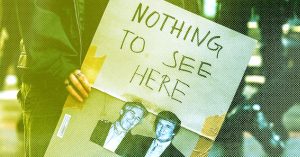At the Goldman Sachs Communacopia + Technology conference held in San Francisco this week, more than one hundred Fortune 500 chief executive and financial officers gathered to answer investor questions about company performance and outlook.
Warner Bros. Discovery CEO David Zaslav and Mattel CEO Ynon Kreiz were on hand to discuss the Barbie movie which has earned more than $1.38 billion in worldwide box office and is currently the highest grossing film of the year.
Making of a hit
Zaslav explained that the secret to the movie’s success has been a global marketing campaign that every division of the company was able to get behind to create a cultural phenomenon.
“Every asset we had turned pink,” he said, from cakes on shows across Food Network to the field on a Swedish football match at halftime.“ Executing as one company across dozens of channels around the world has been Warner Bros. superpower. Now they’re seeking to rinse and repeat with the rest of the studio’s iconic intellectual property, including franchises like Harry Potter which have been asleep for more than a decade, he explained.
Kriez has been taking a similar approach with Mattel, trying to transform the toymaker into an entertainment empire across film, television, live events, digital experiences and consumer products. In addition to Barbie, the company has been expanding its Hot Wheels universe, with an NBC series and a JJ Abrams movie in the works.
“It’s really about the emotional connection that people have with our brands, and this goes back to the origin of our strategy when we realized that people who buy our products are not just consumers, they are fans, and in the aggregate a lot of fans become an audience,” Kreiz said.
Paramount CEO Bob Bakish agreed. He is looking to the company’s 100-year old library to mine theatrical, streaming and retail hits, stating its Teenage Mutant Ninja Turtle franchise has driven over a billion dollars in business at retail this year.
Used as training data
But iconic intellectual property is not only valuable to its owners, it’s also valuable to generative AI companies hungry to train their large language models. Some copyright owners see these models as repurposing their content into derivative works without permission, attribution or compensation.
A major sticking point for News Corporation CEO Robert Thompson who said the company is in various negotiations to get compensated. “They’re extracting editorial essence and deriving benefit from it,“ he explained, saying as content owner, News Corp. should benefit as well.
Last month, the comedian Sarah Silverman was among a group of authors who filed a class action lawsuit against OpenAI and Meta alleging that their books were used to train ChatGPT and LLaMA, an open source large language model that’s been used as a foundation model by an untold number of companies. According to The Atlantic, there were more than 170,000 books published in the last 20 years that were found in a dataset the models used that contained the works of bestselling authors Stephen King, Michael Pollan and James Patterson, among others.
How this will end
AI has been a point of contention in the writers and actors strike, which began with the writers more than four months ago and is now one of the longest strikes in Hollywood history. But streaming payments are at issue as well.
Recently in an interview with ET Canada, actor Aaron Paul said, “I don’t get a piece from Netflix on Breaking Bad, and if we’re being totally honest, that’s insane to me. Shows live forever on these streamers and it goes through waves. I just saw the other day that Breaking Bad was trending on Netflix. It’s just common sense. I think a lot of these streamers have been getting away with not paying people a fair wage. It’s just time to pony up.”
On Sep. 5, Warner Bros. Discovery updated earnings guidance to factor in a potential hit of $300 million to $500 million due to the impact of the ongoing strike. In his remarks at the conference, Zaslav who has been part of the strike negotiations said, “We’re a content company. We’re a storytelling company. We need to do everything we can to get people back to work.”
He then added, “People need to be compensated fairly, and they need to feel valued. I was in LA last two days and we really have to focus as an industry. We are trying to get this resolved.”
Read the full article here







